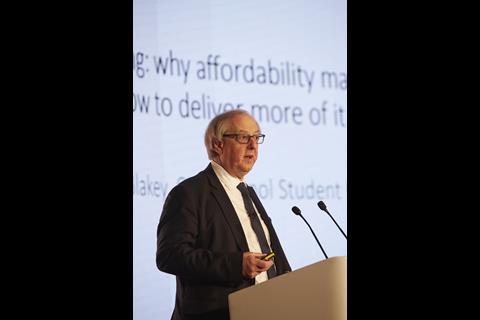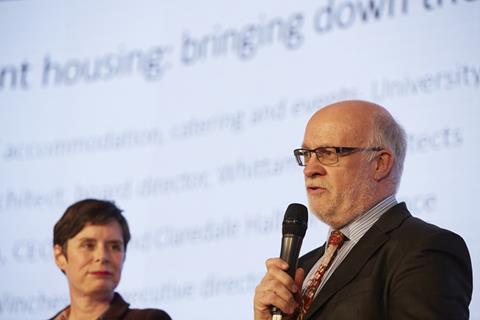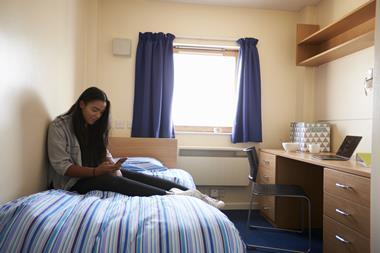Industry experts travelled to Birmingham’s NCC for this year’s Student Accommodation Conference & Awards last week to debate the sector’s hottest topics and learn from industry innovators.
Here are the five key takeaways:
1. Students wise to poor value
The affordability of student housing has risen up the political agenda, as evidenced by London mayor Sadiq Khan’s draft London Plan, published last month. It was also, unsurprisingly, a major theme of this year’s conference.
Affordability, delegates heard, is not just about providing cheap rooms, but demonstrating why a student is being asked to pay a certain price.
Interesting debate going on right now at #SAconf about affordability - huge challenge for student accommodation investors and one covered extensively in our recent #PWSAdebate with @CBRE_UK's @PBSAguru who will speak later today @StudentPW https://t.co/CwpHFRLFil
— PropertyWeek (@PropertyWeek) December 7, 2017
Cushman & Wakefield’s student accommodation report, which was launched at the conference, highlighted that 43% of all new beds available for 2017-18 were studio apartments. Outside London, a studio is 45% more expensive than an ensuite room. “This is causing students to question whether paying for a studio is giving them a 45% better experience,” said Cushman & Wakefield student advisory lead David Feeney.
Some studio providers were discounting prices and incentivising students to take rooms because they had failed to fill them by the start of the 2017-18 academic year, despite a 1.8 student-to-bed ratio demonstrating ample demand, he added.
2. Bring down the costs
Nick Riley, architect and board director at Whittam Cox Architects, said it was time for disruptors to enter the market and work out ways to deliver affordable accommodation that is “for the many, not the few”.
“To cut costs developers cannot just tinker with fixtures and fittings,” he added. “They need to be innovative with their use of space. Providers need to understand how students use a building, where the space is being used and where it is being wasted, and then make changes to their models to reflect this.”
Huge attendance at today’s @PropertyWeek @StudentPW conference in Birmingham. Great to see so many contacts and friends so far #SAConf pic.twitter.com/3RYyDEHpGi
— Nick Riley (@nickriley_arch) December 7, 2017
Jo Winchester, executive director at CBRE, suggested that planning regulations could be amended to allow alternative uses for student accommodation outside term time. Winchester said this would take away the need to tie students into leases that are weeks longer than the academic year, providing them with better value for money.
3. Time to toughen up over Brexit
The subject of Brexit was met with a mixture of defiance and pragmatism.
Keynote speaker Sir Anthony Seldon, vice-chancellor of the University of Buckingham, told the audience to stop complaining about Brexit and start planning for the future.
Sir Anthony Seldom on the impact of #Brexit and global trends on the UK #university sector at the #SAConf in #Birmimgham pic.twitter.com/OX2eOfW6T1
— Blackstock Consulting (@BlackstockPR) December 7, 2017
“Start doing research into what the post-Brexit market could look like and how you can plan for it. Those who will thrive are the ones who think lucidly and smartly now,” he told the conference.
During a debate on investment in student accommodation, PBSA providers were told to strengthen ties with international agents and sell the benefits of studying in the UK.
“China, India and Korea are the growth engines for enrolment in the UK and the US,” said Michael Smith, regional chief executive, Europe and US, at Mapletree.

4. Understand demand
PBSA providers need to understand the social and economic dynamics of a location before choosing the type of accommodation to build there, delegates heard.
Cushman & Wakefield’s Feeney said that if providers ignore the unique make-up of an area they risk losing out to HMO landlords.
Despite #Brexit, UK remains most attractive European investment market for PBSA alongside emerging Ireland & Holland, and established Germany. How long will that balance hold? #SAConf pic.twitter.com/a0G01z84i0
— PropertyWeek (@PropertyWeek) December 7, 2017
“Student-to-bed ratios have traditionally been the measure of demand, but they are no longer the best indicator,” he said. “Plymouth is a good example of this. Its student-to-bed ratio is high and its university has performed well over the past few years. However, there has been a large number of unfilled beds over the past two years. Students studying in Plymouth are largely from lower socio-economic backgrounds and a number of them simply can’t afford £170 a week for a studio.
“We’re seeing unfilled PBSA beds and HMOs have taken up the slack, providing quality accommodation for £90 a week near to campus – they are definitely filling the gap.”

5. What 2018 holds
Speakers shared their thoughts on how the provision of student accommodation would evolve next year. Delegates heard how offsite modular construction could deliver buildings at a lower cost while townhouses and 10 sq m rooms were being considered as ways to deliver affordable living.
Meanwhile, Aaron Maskrey, head of research and intelligence at Global Student Accommodation, said it was looking to Japan for inspiration and planned to deliver an innovative space-saving room design next year.
Keith White, of long time @StudentPW supporters @CRMStudents, hosting an interesting panel on investing in student accommodation - GSA's Aaron Maskey says differentiation is key #SAConf pic.twitter.com/pVDzkTDXuf
— PropertyWeek (@PropertyWeek) December 7, 2017
A number of predictions were made on the back of the draft London Plan, unveiled last month, and specifically Khan’s call for universities and the private sector to work in closer partnership.
Allan Hilton, chief executive of Cass and Claredale Halls of Residence, said: “The London Plan is going to change the landscape of London. His proposals state student accommodation can only be built if providers have an agreement with a university. This means universities and the private sector have to work together. It is the only way forward.”
Speakers said they also expected to see the sector respond to the mayor’s call for PBSA providers to develop models for the delivery of affordable student accommodation.
“Khan is challenging the sector to deliver affordability and what happens in London generally spreads to the rest of the country,” said Hilton.








































No comments yet